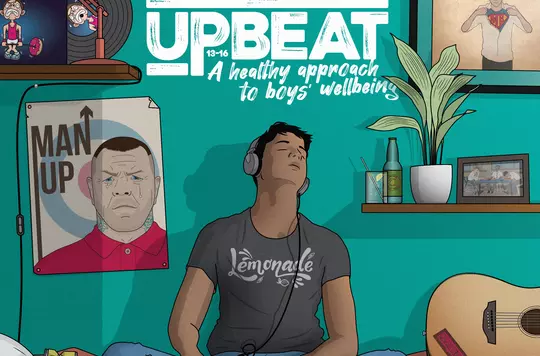6 June 2022
'Withness': Re-framing youth and children's ministry
Jo Taylor

Jo Taylor reminds us why connecting with children and young people is vital.
Susie Dent, from Channel 4’s Countdown, regularly delights her 992k Twitter followers with her ‘word of the day’ tweets. Dent has mastered the art of the ‘subtweet’ – when a tweet references a specific event or person without naming it or them openly. Dent’s ability to comment on a mood or moment brings joy, relief and a sense of community, as once the thing is named it’s easier to talk about.
As the world has sought to navigate a pandemic over the past two years, there have been a number of shifts. The Church – and youth and children’s work, specifically – hasn’t been immune to these shifts and many have tried to name them so they can be better understood.
A simple but unusual word has come into focus: 'withness'.
Withness is a strong, authentic connection forged with the heart of another. Withness has allowed us to articulate where we have seen God’s activity in the world most vibrantly and shape how Salvation Army youth and children’s workers can move forward into wider, deeper and more life-giving ministry.
God is with us
God’s desire for relationship, for close connection, can be seen throughout the Bible.
Right at the beginning, in Genesis chapter 1, we read that God created the Earth and all that is in it and, at the end of each day of creating, saw that it was good. But despite the pleasure it brought him, God wasn’t done. There was one thing needed to improve and complete this magnificent creation: people. Chosen people. Loved people. God didn’t want to hold us at arm’s length. God wanted withness.
So, ‘The Word became flesh and blood, and moved into the neighbourhood’ (John 1:14 The Message). Jesus’ birth, life, death and resurrection all point in the same direction: towards us.
Priest and blogger Drew Downs writes: ‘Jesus came to be with us and to teach us this withness. From gathering around tables to eat and drink in remembrance of Jesus to our healing Jesus in hospitals, feeding Jesus in our soup kitchens, sheltering Jesus in our homeless shelters, welcoming Jesus in the refugee, or visiting Jesus when he’s incarcerated, we are practising withness with God as we practise it with one another.’
This has always been true, so why is it important that we speak about it now?
Declining church attendance and the impact of the pandemic
There are two realities that need to be named. Both have been true for some time and have been exacerbated by the upheaval and challenges of the past couple of years.
The first is that the Church in the UK, including the Army, is in numerical decline.
Even if your corps is one of the few churches not experiencing decline, the truth is that the majority of people are not in our buildings. The most generous estimates suggest that a third of the population have some kind of connection with church and one in twenty regularly attend Sunday worship. These numbers are even lower among children and young people.
The second reality is that our children and young people are struggling.

A 2020 report from the National Youth Agency revealed that there are more than a million young people with known needs that have been amplified by the Covid-19 pandemic and an estimated two million young people with emerging needs triggered or caused by the pandemic.
More than a million people aged 8 to 19 have self-reported mental health issues. There has been a spike in calls to helplines, with 84 per cent of young people with existing mental health needs reporting worse mental health following school closures and 26 per cent no longer able to access mental health support.
Young people are anxious about the damage we are doing to the environment, with three quarters of respondents to a University of Bath survey thinking the future is frightening and more than half (56 per cent) believing humanity is doomed.
Reflecting on the turmoil in the Church, author Sarah Bessey laments: ‘The word ichabod came to me. The glory has departed.’
If we're honest, most of us have experienced moments like this. But hopefully we see those glimmers of light that remind us of what is most true.
Bessey continues: ‘The Incarnation means that God’s glory is here. Always has been here. Is still here. God became a person and dwelled among us. God grew inside a young woman who knew her Scriptures, and was born one night in Palestine. God nursed and cried and grew and listened and loved…
‘The glory of God moved right into our neighbourhoods... Out of the temples and arks and behind the veils, right out into your front street. The glory of God is now hiding in plain sight in our right-now lives.’
Being with God and others
If God’s primary form of ministry is withness – close connection and deep relationship – what does this mean for us?
It means a focus on presence, as we seek to support and resource youth and children’s workers. That presence can’t be about what we do in our spaces because most people aren’t there. They’re in their spaces.

Our youth and children are in schools, universities, football clubs, parks, on the streets and in their homes. Some of them – too many of them – are in pain, on the margins, excluded. But the good news is that God, Emmanuel, is there too, inviting us to share and point out his transformational presence.
All over the territory, youth and children’s leaders are moving into these spaces and people are noticing again the glory of God. Salvationists have taken their youth work on to the streets. There are now 136 members of the Army’s Street-Based Youth Work network and nine brand-new youth ministries.
Starfish is a mentoring programme running in primary and secondary schools. Well-trained volunteers are working with school staff to identify vulnerable students who could benefit from a positive relationship with an adult.
In one case this led to a corps being asked to provide a holistic package of support for the whole family. Homework clubs, football training, dance groups, music lessons and university chaplaincies are just some of the opportunities Salvationists are investing in to ensure presence, offer connection and point out what God is already doing.
It’s not just about physical spaces. Our children and young people are talking about mental health, identity and gender issues, the inequality and human trafficking. We’re seeking to be present in those conversation spaces too, with resources such as Upbeat and True Story, as well as training on pastorally supporting LGBTQ+ young people and trauma-informed practice. The more of these spaces we can be present in, the more we’re able to point towards God.
Author and seminary teacher Andrew Root says: ‘Ministry is about connection, one to another, about sharing in suffering and joy, about persons meeting persons with no pretence or secret motives. It is about shared life, confessing Christ not outside the relationship but within it. This, I learned, was living the gospel.’
There are questions for each of us, as individuals and as a Movement. Where are the people God is calling us to meet? Who is God calling us to open our lives to? How could a journey towards withness – with God and with others – transform our world?
- This article was originally published in Salvationist magazine on 12 March 2022.
Written by

Jo Taylor
Territorial Youth Specialist (Discipleship)
Discover more

Children & Youth
Working alongside young people is central to the mission of The Salvation Army.

Upbeat
A healthy approach to boys' wellbeing, Upbeat helps 13-16 year old young men develop their emotional literacy.

True Story
Inspiring young people and children to take practical action to help the victims of modern slavery.

SHALOM
The 2023 Youth and Children’s Leaders Conference.
